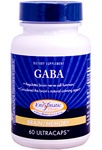| Gamma-aminobutyric acid functions as a neurotransmitter in the central nervous system, decreasing neuron activity thus preventing them from overfiring. With niacinamide (B3) and inositol, GABA prevents anxiety and stress-related messages from reaching the motor centers of the brain, and is essential for brain metabolism.
GABA has been used in the treatment of depression, manic-depressive (bipolar) disorder, seizures, premenstrual dysphoric (feeling depressed) disorder, and anxiety. GABA serves as a inhibitory neurotransmitter to block the transmission of an impulse from one cell to another in the central nervous system. GABA improves sleep cycles leading to more restful sleeping. GABA has powerful stabilizing effects on blood pressure. GABA is a very effective analgesic, eliminating pain from chronic conditions such as arthritis and lower back pain. GABA supplements can help to relieve the intensity of pain. They may also lessen pain-related nerve impulses.
Gamma.-aminobutyric acid naturally stimulates the anterior pituitary gland to secrete higher levels of human growth hormone (HGH). GABA signals the pituitary to naturally release HGH. HGH is a hormone that is widely known for its powerful anabolic (muscle building) effects as well as its lipotropic (breakdown and utilization of body fat) effects. Human growth hormone (HGH) is produced, stored and secreted by the pituitary gland located at the base of the brain.
GABA has been used to treat both epilepsy and hypertension where it is thought to induce tranquility in individuals who have a high activity of manic behavior and acute agitation. Levels of GABA in the brain may influence seizure activity in individuals with epilepsy. GABA appears to inhibit nerve cells in the brain from firing and setting off seizures. Gamma.-aminobutyric acid analog gabapentin has been approved in the United States for the treatment of epileptic seizures and post-herpetic neuralgia. The drug has also shown efficacy in controlled studies for treating neuropathic pain of varying etiologies. |
